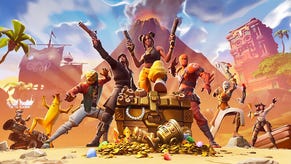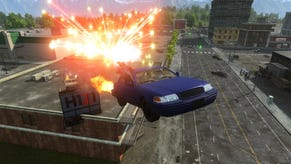H1Z1: Sony Online Joins the Zombie Survival Zeitgeist
There's another open-world zombie apocalypse survival game on the horizon. Why?
This article first appeared on USgamer, a partner publication of VG247. Some content, such as this article, has been migrated to VG247 for posterity after USgamer's closure - but it has not been edited or further vetted by the VG247 team.
Sony Online Entertainment announced its zombie apocalypse survival simulation H1Z1 early last month, making it the fourth major title built on the studio's Forgelight Engine. H1Z1 - whose name is a reference to H1N1, also known as swine flu - is the also the latest in a growing number of multiplayer survivalist titles.
What about the specifics? H1Z1 is free-to-play, something SOE knows very well, since all of their online titles now operate on that business model. It's an open-world title with fighting, crafting, zombies with emergent AI, and vehicles. This is where some DayZ fans will take notice because while the DayZ mod for Arma II featured vehicles, the DayZ standalone is currently vehicle-free. SOE has been side-stepping the usual road to launch by talking to the community via the H1Z1 subreddit. The game is expected to launch on Steam Early Access "very soon," but it will also be coming to PlayStation 4.
SOE recently did a 12-hour livestream of H1Z1 and what they've shown is largely in line with other titles like DayZ, Rust (which removed its zombies in February), Day One, 7 Days to Die, Nether, and Infestation: Survivor Stories. You craft, you fight, you hide, and you hope something or someone dangerous doesn't come along and kill you while you're still crawling your way up from nothing. Even beyond open-world survival games, the zombie apocalypse is getting hit pretty hard with additional games in other genres, like State of Decay, Project Zomboid, and Dead State.
What's so awesome about the zombie apocalypse?
Is it the zombies? The idea of the zombie horde has enraptured pop culture since director George Romero first popularized it in 1968's Night of the Living Dead. Prior to that, the concept originated in Haitian folklore, but Romero's zombies are generally what people think of when you mention the word. For Romero, the zombie was a direct metaphor for societal decay, but most modern media use the zombie as a backdrop to explore the decay of the concept of humanity. In fact, most zombie media now is less about the zombie apocalypse surrounding the characters and more about how they react in a situation where civilization and society break down.
In short, most zombie movies and television shows are about people being dicks, now that things like rules and laws aren't holding their inner nature back. Looking at shows like The Walking Dead, the fact that the zombies are behind the apocalypse is secondary to the fact that there is an apocalypse and society has fallen as a result. Creators need an apocalypse situation and we all understand how zombies work now. It's a decent shorthand.
This actually carries over pretty well to the most popular open-world survival games: DayZ and Rust. Many of the stories you'll hear from within the community aren't about tense confrontations with zombies, they're about interactions with other players. They're about the fighting, the thievery, the roving mobs of murderers, and the cultish groups that are created in such situations. They're also about the friendships, the random kindness, and the helping hands that occasionally punctuate the mire of horrible things that go on.
DayZ creator Dean Hall told Wired that the game was intended as a social experiment, something to make players confront their own humanity. The game largely fulfills that promise.
H1Z1, DayZ, and Rust are power fantasies, but in a different kind of way than the first-person shooters and third-person action-adventure games we're used to. Here, we trade limitless power for limitless possibility. Like Eve Online, the game provides a host of tools and lets players go wild. It's not for everyone and there's something very 'bootstraps' that goes on in the minds of some players; that belief that if you're not doing well, it's because you're not stepping up enough. There's a certain amount of freedom in that, and unlike the real world, all you lose with each setback is time and digital goods.
There's also the fun of emergent gameplay that can pop up in these games. While the moment-to-moment play can be quite boring, you're sticking with it for those very exciting random experiences. Those water-cooler stories that you can share on Reddit, NeoGAF. and Imgur. To bring EVE Online back into the conversation, for every rote mining action, there is the possibility of massive wars like the Battle of B-R5RB. Those big moments make up for all the rest of it.
Why are we just now seeing this big push? Probably because of DayZ. That game went from a mod for Arma II to the reason Arma II pushed to the top of the Steam charts. The game went from selling 1 million copies in three years to matching that number in a few months once the mod was out. That's why Bohemia greenlit the standalone game and it's working out for them. Hall tweeted today that DayZ standalone has sold over 2 million copies in 6 months, and that game is an Early Access title for $30.
So, Sony Online Entertainment wants to jump in on that action, like major publishers previously jumped in on MMOs and MOBAs once someone showed there was an audience. (Because for all the talk of business people and marketers knowing what sells, they honestly don't. They just know what sells now.) They have the resources, they have the experience in running online and free-to-play games, and they obviously have developers who are passionate about the genre.
Will H1Z1 succeed? No clue, but at least what I'm seeing now doesn't look like it'll fail.










